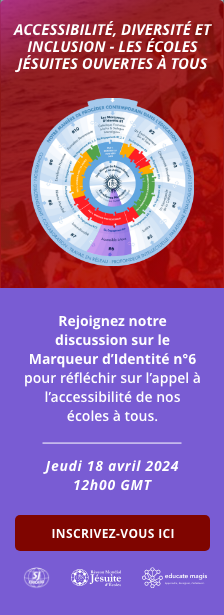In this interview Ilse Dekker, Director of JECSE (Jesuit European Committee for Primary and Secondary Education), shares her reflections on how essential is to promote an understanding that staff and faculty are joining a global network and that they have a role to play in animating it. Specially taking into account the European context of today, where the mission of humanization and reconciliation is a huge challenge.
1. Could you tell us a little bit about yourself, your background in Jesuit Education and your current role?
My name is Ilse Dekker. I am a cultural anthropologist specialised in religious anthropology and as such I have been a teacher in religious education in one of the Dutch Jesuit colleges for many years. Working together with the Jesuits connected to our schools, and passionate about Ignatian spirituality and pedagogy, in time I became the education delegate for the Netherlands, thus also engaged in the JECSE-network (Jesuit European Committee for Primary and Secondary Education). I am now the director of JECSE, working together with our steering committee and team of education delegates to support 187 schools in Europe, also including schools in Russia, Egypt and Lebanon.
2. How do you think Training for Global Networking (Action #11, outlined below) will help you/the schools in your region to align with the mission of the Society of Jesus?
The Delegates commit to including in new faculty and staff training programs an understanding that faculty and staff are joining a global network and that they have a role to play in animating it.” – JESEDU-Rio2017
The 11th RIO action asks that we promote through our staff training programs an understanding that staff are joining a global network and that they have a role to play in animating it. I think this understanding is essential to inspire and support our schools. There are quite some reasons why it is not so easy to offer our holistic Ignatian education in the European context of today. Within the European patchwork of cultures, languages, of complex histories and new divisions, our mission of humanization and reconciliation is a huge challenge. Our secularized and multi-convictional societies are a rich environment, demanding though that we find new language for dialogue. And in our current climate of economic pragmatism, our schools are under a lot of pressure to reduce education to mere ‘training for employability’, so it takes true courage and vision to keep offering and developing holistic education today. This is why I think feeling part of a network of schools sharing the same ‘dream’ is so important.
3. Could you tell us how the implementation process of this action has been in your Region? What steps have you and your Schools taken or do you plan to take?
In our regional European network we talked with Dani Villanueva sj, coordinator of the Jesuit Network Initiative, about the dynamic of networking as a means to strengthen our common initiatives; it was recognized that some problems require an interconnected approach. We thus explored how we might, as delegates from different Provinces, expand the possibilities of our networking. We surfaced the strengths and needs in our different Provinces to determine a number of areas that we might fruitfully collaborate on. Three specific task groups were formed on the topics of Formation, Global Citizenship, and Safeguarding, which are now developing important new initiatives at the European level together.
Also as JECSE we now aim to organize specific shared initiatives, like our coming IPP conference in Dublin that the Irish Province will offer together with JECSE, and new initiatives in collaboration with the Center for Ignatian Pedagogy (ZIP) in Germany.
And JECSE is the link to the global network, informing the European delegates about what happens at the global level, like the global colloquium in Indonesia in the summer of 2020.
4. What would you say are/will be the main challenges in the implementation of this action? What would you advise other schools and provinces to consider before, during and after the implementation of this action?
The biggest challenge, I think, is not losing sight of the importance of our connectedness under the (huge) time-pressure of every-day school life. We should somehow make our collaboration one of our priorities and stay connected, both in our awareness and in our actual communication. Sharing expertise, experience, stories and resources is indispensable. As well as facilitating time and safe spaces for reflection and sharing, at the local, regional and global level. Of course we cannot meet all the time but regularly attending conferences and membership of the online Educate Magis community helps a lot. Actively participating in this network, crossing borders in our collaboration, is actually dóing global citizenship.
5. Anything else you would like to add? (optional)
As educators we should always remember that our school communities provide a wonderful opportunity to give many students, parents and staff members a sense of belonging and a deeper awareness of our mission and our interconnectedness in this. And it is through our collaboration as schools in local, regional and global networks that we can truly become learning communities, inspiring each other and opening new horizons.
Se connecter ou Adhérer
pour créer et afficher des commentaires

